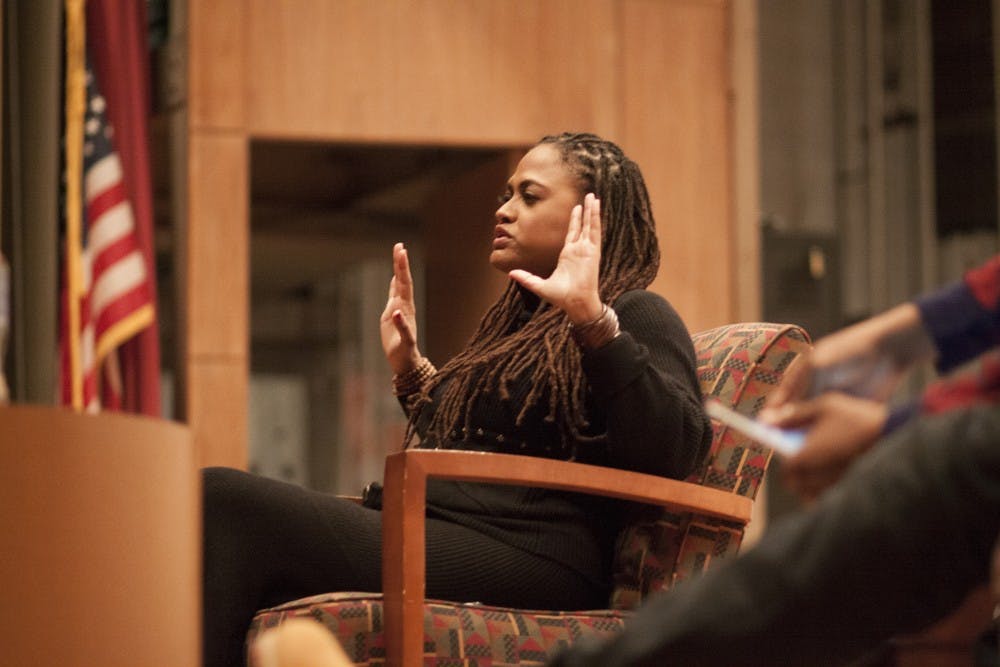By SHERRY SIMKOVIC For The News-Letter
Ava DuVernay, who directed the film Selma and is the first black female director to have a film nominated for the Academy Award for Best Picture, spoke at the Milton S. Eisenhower (MSE) Symposium on Tuesday.
The event opened with video of DuVernay’s career, featuring various actors and actresses discussing her work ethic, the environment she is able to create on set and her ability to produce the best film possible by getting the most out of the actors with whom she is working.
Dwight “D.” Watkins, who spoke at MSE earlier this year, was the moderator of the event.
Watkins began the conversation by asking DuVernay to discuss her early years in the film industry.
“I never had that big come-up moment,” DuVernay said. “It was a scratchy, scrappy and soul-crushing experience. There was no big moment, but it was more like a progression. It was a process.”
Watkins then asked DuVernay why she decided to found her own film distribution company, Array, which works to bring African films to the United States.
“I was saving for a house. I was 24-years-old, and my mom had bought her first house when she was 19, and she thought that it was crazy that I didn’t have one,” DuVernay said. “So I took the $50,000 I had been saving for a house, and I made a movie. It was some obscure artist stuff that I knew no studio would want. So I had to figure out a way to distribute the film.”

Today the company is in its fifth year and has just distributed its 10th film, Ayanda. The South African movie tells the story of a young woman who revives her late father’s auto repair shop. Some audience members had seen it.
“That’s why it’s worth it,” DuVernay said. “Not many people see the films, but there’s one person who saw a film they wouldn’t have seen otherwise.”
Watkins then asked DuVernay to speak about life as a black woman in Hollywood.
“It’s hard, and it’s an old story,” she said. “It doesn’t empower me to think about it in my everyday life. It’s 2015 and people still say stuff.” DuVernay then shared an example from a meeting with Hollywood executives she attended after returning from a trip to India that she described as “life changing.” Once she said that she had been in India, an important executive began to speak in an Indian accent.
“Eliminating racism is an incremental process, even in 2015,” DuVernay said about the incidient.
Watkins then transitioned the conversation to Selma. He asked her to discuss her decision to take over the script.
“There were some nuances missing — like women. The question that came up for me at times was how to portray Martin Luther King, Jr.’s extramarital transgressions,” said DuVernay. “Is he any less of a leader, any less of a world changer, because of his personal life? I wanted to explore his message from all angles but still get that successful ending.” Watkins mentioned the theme of violence that winds through Selma.
“I always hated Civil Rights movies as a general rule, so I wanted to make [one] I would watch. I wanted to mimic the way we felt watching videos of Freddie Gray and Eric Garner and all the other people who were killed,” DuVernay said. “Violence is never shown but to exclude violence is to ignore much of the history of our nation.”
Watkins added that he thinks Selma is a good introduction for viewers who are not well-versed in the Civil Rights Movement.
He then asked her about her thought on social media as an agent for change.
“It seems like we have more tools now to organize, but they were more organized during the Civil Rights movement,” Watkins said. “People began to respond to images they were seeing on TV, and the problems of racism became a nation’s problem, similar to what’s happening today with online videos of police brutality. So what do you think of using the media as a tool?”
“Images are powerful,” DuVernay responded. “They affect the way we see ourselves and the way we are seen. Will images begin to be foolproof evidence of injustice?”
The next question came from a student who had submitted it online.
“Could you discuss the recent controversies at Mizzou and Yale surrounding free speech and cultural appropriation? Do university officials have a responsibility to police insensitive speech or respond to incidents of racism on campus?” the question read.
DuVernay said that students must be able to communicate with officials.
“I think you have to talk to students and listen to them,” DuVernay said. “At the base level it’s a lack of communication. There are, of course, further problems, but at the most basic level university officials need to hear what the student body has to say.”
Watkins and DuVernay spoke more about the adversity that many students of color face.
“How do people who pay so much money for tuition feel powerless?” Watkins asked.
“How do people who pay so many taxes have so little representation?” DuVernay responded.
For the rest of the event, she discussed a new TV show she is working on about three siblings from Louisiana who return home due to a death in the family.





